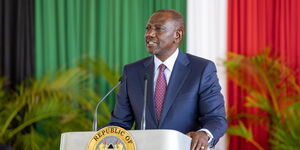Cabinet Secretary for Agriculture Mutahi Kagwe on Friday, May 2, announced looming policy reforms in the tea sector that will bring widespread change to one of the country’s most critical exports.
Through a statement, Kagwe revealed that the reforms will see all 142 factories in Kenya receive a license allowing them to directly sell and export to international markets.
Currently, Kenya mainly exports its tea through auctions such as the Mombasa Tea Auction, where exporters or buyers bid for lots. Tea is normally exported in standardized bulk units (usually 50kg paper sacks or fiberboard boxes lined with aluminum foil or polythene).
In the new reforms, the factories will gain direct access to international markets, thus bypassing the auction system, which acted as a centralised marketplace.
While giving details for the new direction, Kagwe noted the move would eliminate the need for intermediaries, a move expected to significantly improve farmers’ profit margins.
“Our core focus remains ensuring better returns for farmers, strengthening governance in the tea sub-sector, and promoting transparency in smallholder tea factories,” he stated.
Through the licences, factories can set their own prices instead of relying on volatile auction prices, sell value-added or speciality teas (e.g. flavoured, organic, or branded teas) at a premium and develop their own brands and improve margins by targeting retail or niche markets abroad.
For farmers supplying the green leaf, they may get higher payments as factories would earn more through direct sales and even have greater income predictability, as the auction price volatility would be reduced.
Further, direct export allows factories to target premium and speciality markets (e.g. organic, fair trade), which often pay more for sustainably grown or high-quality teas. Consequently, farmers can be encouraged to improve quality for access to these markets, potentially earning bonuses or premiums.
Also, farmers may have greater influence in factory decision-making if the profits and losses from direct exports are more transparent and tied to their supply.
However, potential risks to the reforms for farmers include delayed or unpaid payments, unequal benefits, and increased pressure to produce quality tea.
In 2024, tea exports reached Ksh215 billion, with Ksh181 billion attributed to exports. Kenya exported tea to 96 countries in 2024, with the top destinations being Pakistan with 206.27 million kg (Ksh 70B), Egypt at 86.90 million kg (Ksh 23.96B and the United Kingdom at 57.44 million kg (Ksh 17B).
Other nations included the United Arab Emirates with 30.50 million kg (Ksh 10.27B) and Yemen with 22.69 million kg (Ksh 9.11B). These top five markets accounted for approximately 81 per cent of Kenya's tea exports.
At the same time, Kagwe disclosed the launch of an orthodox tea auction window within the Integrated Tea Trading System (ITTS) in June 2025. The initiative is part of a broader government strategy to diversify tea exports and boost farmer earnings.
The CS emphasised that the new auction, to be managed by the East African Tea Trade Association (EATTA) in collaboration with the Tea Board of Kenya, will offer a dedicated global platform for the sale of Kenya's orthodox teas, an increasingly sought-after variety in international markets.
"This new approach will strengthen our distribution channels and support a shift from the traditional Cut, Tear, and Curl (CTC) teas to more sustainable and premium orthodox teas," Kagwe said.
Orthodox tea refers to loose-leaf tea produced using traditional methods, involving plucking, withering, rolling, oxidation, and drying. This process, particularly the rolling stage, helps to preserve the natural flavours and develop a complex flavour profile.
Orthodox teas, including black, green, oolong, and white varieties, are known for their delicate make and flavour complexity, setting them apart from CTC (Crush, Tear, Curl) teas.












